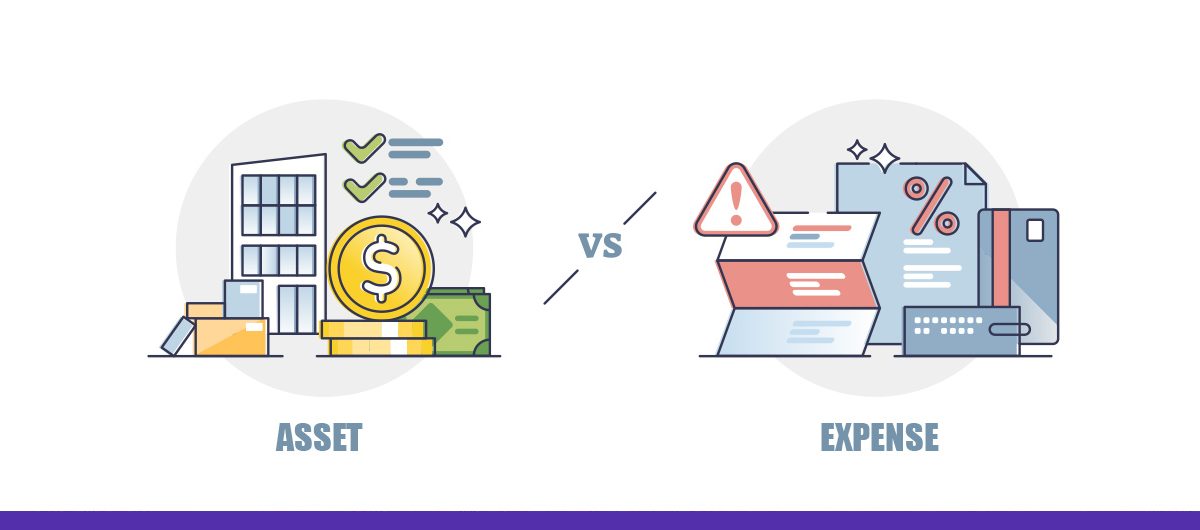Asset Vs Expense: Key Differences And Financial Impact

How To Setup Payroll For Small Businesses: A 7-Step Guide
August 31, 2023
How To Calculate Sum Of Years Digits Depreciation?
September 7, 2023Asset Vs Expense: Key Differences And Financial Impact
In the world of finance, two terms stand out as pillars of understanding: asset and expense. People do wonder what these two terminologies mean i-e asset vs. expense. While they may seem interchangeable at first glance, delving deeper reveals the critical differences that define their role in financial reporting and decision-making. Understanding the key differences can help us navigate the financial system more diligently and confidently.
Asset vs Expense: A Foundational Distinction
To embark on this journey, let’s start by firmly establishing what assets and expenses are. An asset, in essence, is a valuable economic resource with the potential for future benefits. These assets can take the form of tangible assets, such as real estate and machinery, or intangible assets, like patents, copyrights, and trademarks. Assets are crucial contributors to an entity’s overall value and are prominently featured on the balance sheet.
On the flip side, expenses are the costs incurred to generate revenue or sustain day-to-day operations. Expenses find their home on the income statement, where they are subtracted from revenues to calculate net income. Unlike assets, expenses often involve immediate consumption and do not promise long-term value.
Assets: Building Wealth Over Time
Assets form the bedrock of financial stability and growth. They play a pivotal role in shaping an entity’s financial standing. When an entity acquires an asset, it’s essentially making an investment with the potential to yield future economic benefits. Let’s delve into a real-world example to illustrate this point.
Imagine a company investing in a piece of real estate for its operations. Not only does this property provide a space for business activities, but it also has the potential to appreciate in value over time. This appreciation can significantly bolster the balance sheet and, consequently, the overall financial health of the company. This is a classic example of how assets, over time, build wealth and stability.
It’s important to note that assets are often categorized into two main groups: current assets and non-current assets. Current assets, such as cash and accounts receivable, can be readily converted into cash within a year, ensuring liquidity. In contrast, non-current assets, like long-term investments and property, offer value over an extended period, contributing to long-term financial stability.
Expenses: Navigating the Cost of Operations
Expenses, while not directly contributing to an entity’s long-term value, are indispensable for day-to-day operations. These costs, which include items like employee salaries, rent, and utilities, are essential for ensuring a business function seamlessly. However, expenses differ from assets in that they don’t extend their impact beyond the immediate operational cycle. To illustrate this point, let’s consider the example of employee salaries.
Employee salaries are vital for the smooth functioning of a business, but they are entirely consumed within the current accounting period. Unlike assets, expenses do not promise future economic benefits or long-term value appreciation.
Clarifying the Misconception: Expenses vs Assets
A common misconception is that expenses can also be considered assets since they contribute to the business’s functioning. However, this understanding contradicts the fundamental distinction between the two. While expenses are necessary for operations, they do not hold the same long-term value and economic benefit as assets. Assets appreciate over time and can be used as collateral, whereas expenses are incurred to maintain operations and generate revenue.
Expense Recognition Principle: Immediate Impact
Accounting principles further emphasize the distinction between asset vs expense. The expense recognition principle states that expenses should be recognized in the period in which they are incurred, rather than when the related cash is paid. This principle ensures accurate financial reporting and reflects the true costs of generating revenue. Assets, on the other hand, are recognized initially at cost and then adjusted for factors like depreciation, amortization, or impairment.
Asset vs Expense: Informed Decision-Making
Now that we’ve explored the intricacies of asset vs expense, let’s discuss how they influence informed decision-making.
Strategic Asset Management
Asset management is a critical aspect of financial planning. Both businesses and individuals need to regularly assess their asset portfolio to maximize returns. This involves evaluating the value of assets and considering factors such as appreciation, depreciation, and market trends. Let’s look at an example.
Suppose you are an individual investor with a diverse portfolio of stocks and bonds. To maximize your returns, you need to monitor market trends, assess the performance of your investments, and make strategic decisions. By doing so, you can secure your financial future and make informed investments.
Expense Control for Financial Health
Effectively managing expenses is equally vital. While expenses are not assets, they directly impact an entity’s profitability. Minimizing unnecessary expenses and optimizing operational costs can lead to improved bottom-line figures. Let’s delve into a real-life scenario.
Consider a small business owner who runs a local restaurant. To enhance profitability, they carefully track their expenses, looking for areas where costs can be reduced without compromising the quality of food and service. By controlling expenses, the restaurant can maintain healthy profit margins and sustainable growth.
Balancing Act: Allocating Resources
A crucial distinction between asset vs expense is how resources are allocated. Businesses must strike a delicate balance between investing in assets that will appreciate over time and managing expenses to ensure profitability.
Imagine a manufacturing company that is considering expanding its production capacity. To do so, it needs to invest in new machinery (an asset) while also managing its operational costs (expenses). Allocating resources wisely, with a focus on both short-term and long-term objectives, is essential for prudent financial planning.
Business Investment vs. Operational Necessity
In the grand scheme of financial management, asset vs expense is not interchangeable. While both play pivotal roles in an entity’s financial landscape, they serve vastly different purposes. Assets lay the foundation for growth and stability, while expenses ensure day-to-day operations. Recognizing this distinction empowers entities to make sound financial decisions that align with their goals.
Endnote
In the realm of financial management, distinguishing between asset vs expense is paramount. Assets are valuable resources with the potential for future benefits and are instrumental in bolstering a company’s financial position. On the other hand, expenses represent the costs incurred in daily operations, pivotal for sustaining business activities. The debate often arises: is expense an asset? The answer is a resounding no. While both are essential elements in financial reporting, expenses are characterized by their immediate consumption and lack of long-term value. Monily provides accounting and financial solutions to all sizes of businesses.
Farwah Jafri
Farwah Jafri is a financial management expert and Product Owner at Monily, where she leads financial services for small and medium businesses. With over a decade of experience, including a directorial role at Arthur Lawrence UK Ltd., she specializes in bookkeeping, payroll, and financial analytics. Farwah holds an MBA from Alliance Manchester Business School and a BS in Computer Software Engineering. Based in Houston, Texas, she is dedicated to helping businesses better their financial operations.






